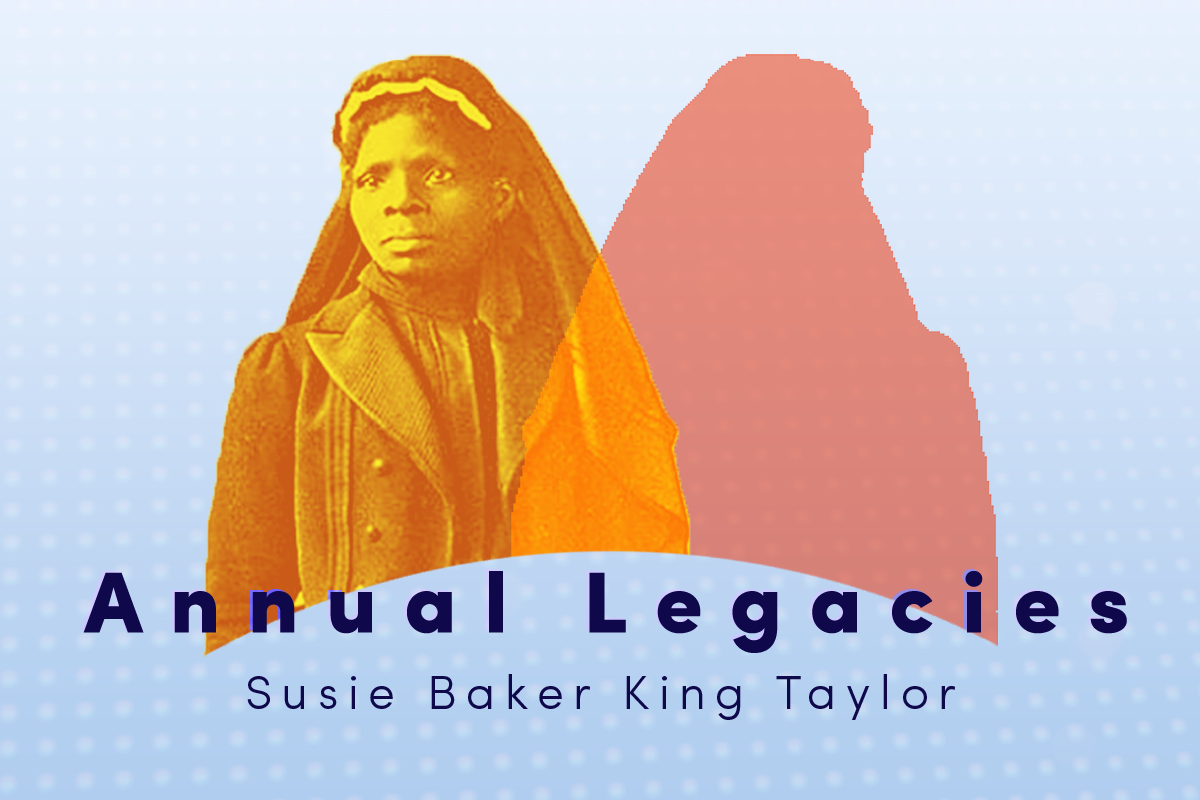Susie Baker King Taylor was born into slavery on August 6, 1848 to Hagar and Raymond Baker on the Grest Farm in Liberty County, Georgia. At the age of seven, the family who enslaved her sent her, along with her younger brother and sister, to Savannah to live with their grandmother, Dolly Reed. Dolly is believed to have been formerly-enslaved by the Grests.
After her grandmother was arrested during a raid on a church and charged with breaking curfew and singing hymns about freedom, which were considered treasonous, someone sent Susie back to live with her mother at the Grest Farm. Just ten days later, nearby Fort Pulaski at the mouth of the Savannah River fell to Union troops on April 11, 1862.
As the United States Army took a firm hold of the South Carolina and Georgia coasts, slaveholding families fled the area, leaving thousands of enslaved people behind and the opportunity for hundreds more to escape and seek refuge with U.S. troops.
Along with her uncle and his family, 14-year-old Susie fled slavery to St Catherine’s Island but within a few weeks were transported by the U.S. Army to St. Simon’s Island, which was firmly in U.S. hands. They stayed there until the fall of 1862, when they were relocated by the U.S. Army again to Beaufort, South Carolina.
Sometime in late 1862 or early in 1863, Susie married Edward King. King was an enslaved carpenter from Darien, Georgia, who had escaped to volunteer for the U.S. Army. He became a sergeant in Company E of the First South Carolina Volunteers, a regiment of formerly enslaved men that had been formed by order of Major General David Hunter. His unit was renamed the 33rd Regiment United States Colored Troops (USCTs) after the Emancipation Proclamation officially allowed African American men to serve in the U.S. Army. Susie enrolled as an army laundress and traveled with her husband’s regiment, but she was quickly tasked with other duties. Apart from acting as a teacher to the men, Susie served as a nurse. She tended those wounded in battle, but also cared for anyone who had contracted smallpox since she had been vaccinated. After three years of service, on February 9, 1866, the 33rd USCT Regiment was mustered out.
After the war, on September 16, 1866, Edward King was killed in a work accident, leaving a pregnant Susie widowed. She had found brief success as a teacher before Edward’s death, but it was short-lived when the American Missionary Association opened and offered free classes to students. Susie worked as a live-in domestic servant, eventually ending up in Boston where she met and married Russell L. Taylor in 1879.
As a married woman, Susie devoted herself to veteran’s aid projects. She helped organize Corps 67 Women’s Relief Corps, a support branch of the Grand Army of the Republic. The GAR was a veterans group that sponsored reunions and other civic activities. Susie served as guard, secretary, treasurer, and eventually president in 1893. At the urging of friends and GAR members, Susie decided to write her memoirs. Published in 1902, Susie’s Reminiscences of My Life in Camp was the only memoir published by an African-American woman about wartime experiences with the army.
As our society now looks to medical staff working tirelessly in hospitals around the world, so too did soldiers and their families during the American Civil War. The need of having someone to help us when we are sick or injured is something that resonates throughout time. And today, thanks to the digital age, we know the names of the frontline medical staff (and all essential workers) that have helped our families and friends, just as they are able to communicate their stories and hardships to us. They are already becoming part of our nation’s–and the world’s–history.
Today, we ask you to help ACWM to remember their legacies by donating to the Annual Legacy Campaign. Your funding is imperative to helping the museum preserve one of the largest collections of Civil War artifacts in the world and the stories that go along with them, as well as provide unparalleled educational resources for teachers, their students, and for you.

